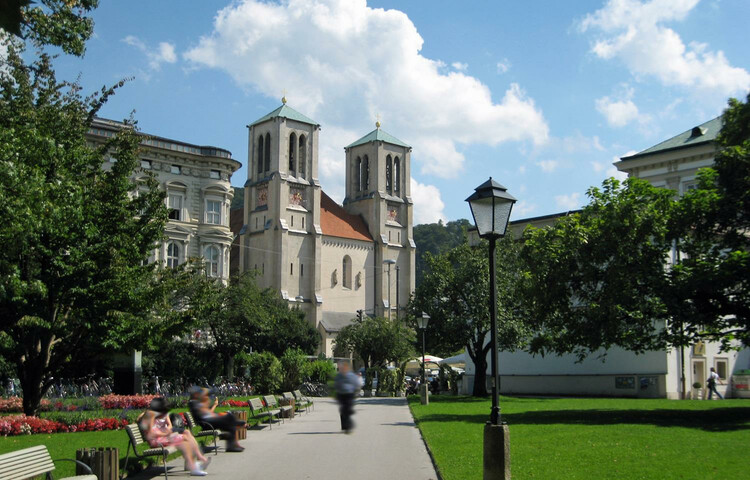Chor-Orchesterkonzert
Johannes Brahms & Gottfried von Einem
With the ‘Alto Rhapsody “ for alto voice and male choir on parts of Goethe's ”Harz Journey in Winter’, Johannes Brahms creates a work of the most haunting depth of expression. The despairing harmonies of the introduction (‘...by desolation devoured...’) lead into the pleading plea of the alto voice (‘...ach wer heilet den Schmerz...’); in the concluding chorale song of the male choir in dialogue with the alto voice, the ‘Father of Love’ is invoked for consolation in a prayerful attitude.
The central work of the concert evening is the song cycle ‘Rosa mystica ’ by Gottfried von Einem based on selected poems by H. C. Artmann. The eponymous title refers to the setting of the fifth song after Artmann:
„maria wird vom glanz der abendlichen sterne versiegelt
der bittere gelbe mond zu ihren füßen träumt aus steinernen tulpen
die nacht der brunnen fällt wie ein enzianblaues kleid weit in den bergen
aus dem gezweig der zeder schimmert ein mattgoldenes kreuz
ein stiller sanfter heiligenschein der ihr rundes haupt birgt.
der stundenschlag vor morgen verklingt leise
und im rötlichen dämmer der rostmüden torgitter
sinkt langsam von ihrer hand entblättert
die traumschwere rose.“
Artmann's love poetry and Gottfried von Einem's congenially expressive music achieve an expressive density similar to Schubert's or Mahler's great song cycles. Artmann's lyrical, metaphorical language inspired the composer to utilise the full range of his compositional skills. Melodic arcs ranging from cheerful to melancholic alternate with ecstatic, bizarre melodic lines - from waltzing bliss to mourning, from longing for love to abandonment.
The concert ends with Johannes Brahms‘ lament ’Nänie ‘ on the poignant poem by Friedrich Schiller “Auch das Schöne muß sterben”. Brahms composed the work on the occasion of the death of his friend, the painter Anselm Feuerbach. In this touching three-part choral work (praise, lament, consolation and realisation), Brahms nevertheless allows consolation to shine through in the lament in the face of the imponderability of fate. This is epitomised by the opening key of D major and the middle section in F sharp major - they allow us to experience the lament flooded with light and hope to germinate. ‘Even if the heroes of antiquity could not be saved from transience: In the end, there remains consolation and the knowledge that beauty lives on in song in a transformed, glorified form.’
Gottfried von Einem (1918–1996)
‘Rosa mystica’ Eight songs after texts by H. C. Artmann
‘Wandlungen’, op.21
Johannes Brahms (1833–1897)
Nänie op. 82
Alt-Rhapsodie op. 53
- Katharine Goeldner - mezzo-soprano
- Martin Achrainer - Baritone
- Salzburg Chamber Choir & Salzburg Vocal
- Choir Orchestra of the IMP Salzburg
- Rosa Artmann, Speaker H.C.Artmann Texts
- Hans-Josef Knaust Conductor
The association stands for the performance of artistically high-quality works that are rarely heard in conventional concert programmes. In line with the mentoring programme developed by the association, the selected works are performed by professional musicians in conjunction with young students.
The repertoire spans several centuries, with a particular focus on contemporary music (including Stravinsky, von Einem and Kagel). Controversial works are also part of the preferred programme. The association is keen to realise the musical works in the best possible acoustic performance venues.









